Unfolding a myriad of capabilities, these Microsoft Power Platform tools offer robust solutions for the public sector, your ticket to revolutionizing data management, workflow automation, and citizen engagement.
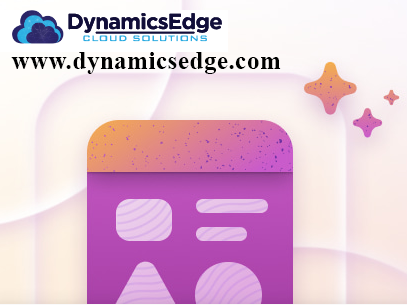
Harnessing Power Platform allows for increased transparency, enhanced efficiency, and improved services, all while maintaining stringent security and compliance standards, whether you are in the US Government or in the commercial or enterprise spaces.
Power Platform, a suite of tools comprising Power Apps, Power Automate, Power BI, and Power Virtual Agents, provides a compelling platform for US Government scenarios. With the capacity to enhance operational efficiency, improve service delivery, and enable intelligent decision-making, Power Platform can transform public service delivery.
Dataverse, previously known as Common Data Service / CDS / Common Data Model / CDM, is a unique, highly scalable and secure data platform. It breaks down data silos, permitting a unified view of data across multiple systems. This unified approach can drastically streamline data management for government bodies, replacing the need for disparate legacy systems such as old Oracle databases.
Through Power Platform, enterprises and government organizations alike can leverage Dataverse to modernize their operations, consolidating disparate data sources and enabling greater insights and efficiency. The breaking down of data silos enhances data visibility, making data-driven decision making more accessible and accurate.
To appreciate the full range of Power Platform’s potential, consider its application in different scenarios. For an electronics manufacturing company and a national electronics components retail outlet, Power Platform can streamline business processes, improve data analysis, and enhance communication. Power Apps Canvas Apps can facilitate easy creation of tailored apps to manage manufacturing processes, inventories, and customer relations, while Power Automate can automate routine tasks. Power BI can provide powerful data analytics to drive business decisions, and Power Virtual Agents can enhance customer service.
In contrast, for a federal government agency coordinating with the governments of California, Seattle, Virginia, Florida, and Texas, Power Platform can play a different, yet equally significant role. It can help automate and manage administrative processes, enhance inter-state data sharing and coordination, and improve citizen services. Power Platform Power Virtual Agents, commonly misspelled as “power vitual agents training” can play an integral part in delivering efficient citizen services, providing a platform for automated, interactive, and intelligent citizen engagement.
Turning our focus to Microsoft Power Apps US Government, Power Apps is a suite of applications, services, and data platform that makes it easy to create apps that solve business problems or address organizational needs. Power Apps allows users to build custom apps that suit their specific needs, without requiring extensive coding expertise. This suite includes two primary types of apps: Canvas Apps and Model-Driven Apps.
Canvas Apps provide the user with a blank canvas to design and build their application with a low-code approach. The advantage of Canvas Apps is the freedom they provide in arranging the user interface and connecting to hundreds of data sources via more than 1400 out-of-the-box connectors! This makes Canvas Apps suitable for tasks that require a highly customized interface and the ability to work with multiple data sources simultaneously.
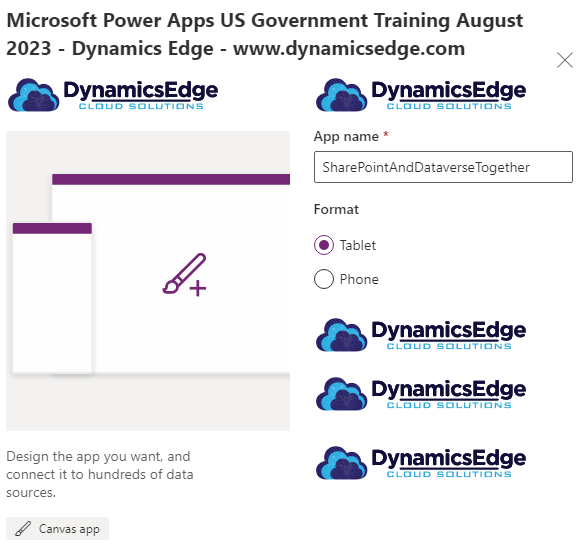
Learn more in Dynamics Edge’s Microsoft Power Apps US Government training August 2023 and throughout 2023 including our PL-100 training courses, PL-400 training and more. For example, a government agency might have data in a SharePoint list, but also want to incorporate data from Microsoft’s Dataverse or even another custom data source.
On the other hand, Model-Driven Apps are based on the underlying data model and relationships in the Dataverse. The user interface is generated automatically, driven by the structure of the data. This makes Model-Driven Apps particularly useful for complex business processes that involve navigating multiple related records, and where data integrity and consistency are paramount.
Dataverse itself is a highly scalable and secure data service that brings the data together and lets the data act together. It’s like a common language that every app can speak. The key to Dataverse is to break down the data silos that exist within organizations.
On the topic of data sources and connectivity, a connector is a proxy or a wrapper around an API that allows the underlying service to talk to Power Apps. Power Apps provides over 1400 out-of-the-box connectors, which can connect to a variety of data sources. But when there is no suitable connector available, one can use a custom connector. However, creating a custom connector involves more work and technical expertise. It’s always smarter to utilize an out-of-the-box connector when possible, for both US government and enterprise scenarios.
Security is critical when considering the application of Power Apps in any scenario. microsoft 365 g5 security gcc along with Microsoft 365 Defender for US Government customers are noteworthy mentions for your secure environment. Microsoft 365 G5 Security GCC provides among the highest level of security and compliance services to government organizations. Microsoft 365 Defender, on the other hand, provides comprehensive threat protection across domains, helping prevent, detect, and respond to threats in an integrated way. This pairing with Power Platform solutions ensures that not only is the solution effective and efficient, but also secure and compliant with US government security standards.
Power Platform offers robust, adaptable solutions that can be tailored to meet the needs of a wide range of scenarios, from enterprises to government agencies. Power Apps, with its Canvas Apps and Model-Driven Apps, provides a flexible platform for creating customized applications. With the integration of Dataverse and the extensive array of connectors, users have the ability to seamlessly navigate and utilize diverse data sources. When paired with robust security measures like Microsoft 365 G5 Security GCC and Microsoft 365 Defender, Power Platform offers a secure, compliant, and effective solution for a variety of scenarios.
Each component of the Power Platform suite offers specific benefits. For instance, Power Apps Canvas Apps provides a low-code platform for creating tailored applications that can interact with a variety of data sources, providing flexibility and adaptability. This flexibility, coupled with the ability to integrate with other Power Platform tools, makes Canvas Apps a powerful tool for business process modernization.
Similarly, Power Apps Model Driven Apps provide a highly customizable, model-driven design paradigm, enabling complex applications to be created with relative ease. These apps, whether standalone or used in conjunction with Canvas Apps, can transform digital operations, enhancing efficiency and productivity.
Power Automate, with its cloud flows and desktop flows, offers robust automation capabilities. By automating routine tasks, it can significantly enhance operational efficiency and accuracy. Its compliance with FedRAMP standards, which really helps you answer the query “is Power Automate FedRAMP certified?”, which the answer is yes, Power Automate US Government is FedRAMP certified. It ensures that you meet the stringent security requirements of the US Government.
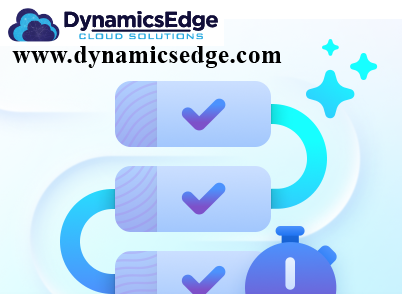
Diving deeper into Microsoft Power Automate US Government training August 2023, Power Automate is a cloud-based service that allows users to create and manage automated workflows across various applications and services. It’s a key component in streamlining operations and ensuring process consistency, particularly useful in large-scale organizations such as federal government agencies.
Microsoft Power Automate Cloud Flows make up quite the transformative set of features for you in Power Automate. Touching on Microsoft Power Automate cloud flows US Government training August 2023, Cloud Flows allow for the automation of workflows across a multitude of services. For example, they can be used to automate responses to emails, to update data across different platforms, or to streamline approval processes. For a government body dealing with vast amounts of data and routine tasks, this level of automation can significantly increase efficiency and reduce manual effort.
On the other hand, Microsoft Power Automate Desktop Flows RPA US Government training August 2023 refers to Power Automate’s capabilities in the realm of Robotic Process Automation (RPA). Desktop Flows allow for the automation of legacy software and processes that are not easily accessed via APIs or other standard data interfaces. RPA tools can interact with these systems at the user interface level, automating clicks, keystrokes, and other user actions. This feature is beneficial for government entities that might still be reliant on older, non-web-based systems.
While Cloud Flows and Desktop Flows form the backbone of Power Automate, a third type of flow, Business Process Flows, guides users through a pre-defined business process, ensuring that steps are followed in the correct order and that all necessary information is captured. This can be especially valuable in government settings, where processes often need to be performed in a particular sequence and must adhere to specific guidelines.
When contemplating the amalgamation of RPA, Cloud Flows, and Power BI for the US federal government, one can envision a seamless flow of data and actions. For instance, RPA could be used to gather data from legacy systems, which is then processed and acted upon through Cloud Flows. This data can then be visualized and analyzed in Power BI, resulting in meaningful insights and informed decision-making processes.
And now we come to Power BI. Power BI provides a powerful data analytics tool, enabling advanced data visualization, AI-driven insights, and predictive analytics. By leveraging Power BI, both enterprises and government bodies can transform their decision-making processes, basing them on accurate and timely data. This complete package of data collection, process automation, and data analysis presents a compelling case for the use of Power Platform in our federal government scenario.
To explore Microsoft Power BI US government further, it is important to understand the comprehensive capabilities this analytics tool brings to the table. Power BI, part of the broader Power Platform, offers a suite of business analytics tools that deliver insights throughout an organization. This platform facilitates a deep connection to data sources, simplification of data prep, and enables the creation of impactful reports, all in an interactive and engaging manner.
At the heart of Power BI’s capabilities is its ability to transform raw data into meaningful insights. By connecting to various data sources, Power BI can amalgamate, visualize, and analyze data. Learn more with Dynamics Edge Microsoft Power BI US government training August 2023. Microsoft PBI training for government enables organizations, including the US federal government, to see patterns and trends that might otherwise go unnoticed.
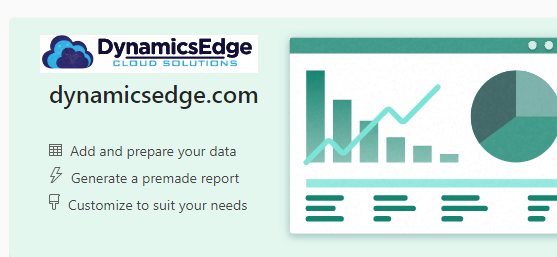
Predictive analytics, a feature that sets Power BI apart, offers immense benefits to governmental bodies including US Federal Government agencies. Microsoft PBI training can help you learn how to leverage Power BI’s use of statistical algorithms and machine learning techniques to identify the likelihood of future outcomes based on historical data. In the US government, predictive analytics can help forecast trends like population growth, economic variables, or emergency service needs. For instance, it can be used to predict potential bottlenecks in public service delivery, thus aiding in proactive planning and resource allocation.
Artificial Intelligence (AI) also plays a crucial role in analytics. AI capabilities in Power BI can help uncover hidden insights within data, making it possible to go beyond what is immediately apparent. It can help identify patterns and anomalies, enabling informed decision-making. For a government agency, AI in Power BI can highlight areas of concern or opportunity that may not be apparent in raw data or surface-level analysis.
Taking a glance at some potential scenarios where Power BI could bring significant benefits for the US federal government:
- Efficient Resource Management: By visualizing data about resource usage, Power BI can help identify inefficiencies in the system. This can lead to more effective resource allocation, reducing wastage and improving service delivery.
- Policy Impact Analysis: Power BI can analyze and visualize the impact of various policy measures. This can inform future policymaking, contributing to more effective and beneficial policies for citizens.
- Citizen Engagement: By visualizing public sentiment data from social media and other sources, Power BI can provide valuable insights into citizen satisfaction and engagement levels. This can help government agencies better respond to the needs and concerns of citizens.
Power Virtual Agents provides an AI-driven platform for creating intelligent, interactive chatbots. Whether used for customer service in an enterprise scenario or for citizen services in a government scenario, Power Virtual Agents can transform the service delivery experience.
For Microsoft Power Virtual Agents US government it can be beneficial to explore the world of intelligent chatbots and their impact on the workings of the government sector. Power Virtual Agents, a part of the Microsoft Power Platform, empowers teams to create powerful bots using a guided, no-code graphical interface. This service eases the process of developing, testing, and deploying sophisticated chatbots that can interact naturally with users.
When it comes to the applicability of Power Virtual Agents for US Government customers, a key consideration is its adherence to the Federal Risk and Authorization Management Program (FedRAMP). The robust security standards of Power Virtual Agents meet the strict FedRAMP requirements, making it a viable solution for federal and state governments.
Reflecting upon the potential of Power Virtual Agents in assisting coordination between a US federal agency and states, it’s enlightening to envisage a set of scenarios. For instance, let’s consider the interaction between a federal agency based in Washington DC and state governments of Seattle, California, Utah, Florida, Texas, Arizona, Virginia, New York, and others.
One scenario could involve the coordination of emergency services during a natural disaster. A bot developed using Power Virtual Agents could be used as the central communication point, providing real-time updates from each state’s emergency response teams. It could process requests for assistance, allocate resources, and offer updates on the evolving situation.
Another example might be the centralization of state education department reports. An intelligent chatbot could streamline the process of gathering, analyzing, and distributing education data from multiple states, providing federal agencies with a unified view of the nation’s education status.
In another scenario, a complex issue might require collaboration between multiple agencies across various states, such as a national infrastructure upgrade. A chatbot could be programmed to manage inter-agency communication, schedule meetings, and maintain updates on project progress.
In an even more ambitious application, consider the coordination of defense and national security operations. Power Virtual Agents could facilitate the rapid and secure communication between the US Capitol, Pentagon, and corresponding state defense agencies, ensuring a cohesive and swift response to any threats.
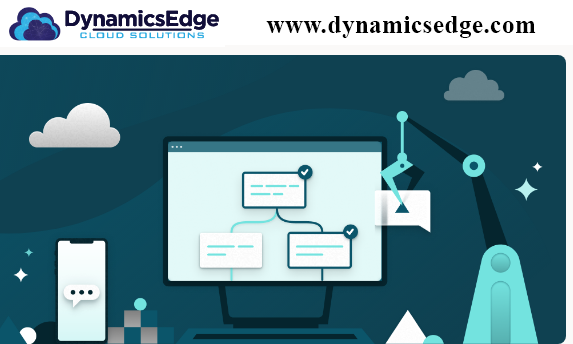
Learn more in Dynamics Edge Microsoft Power Virtual Agents US Government Training August 2023. In the meantime imagine Power Virtual Agents being used to improve citizen engagement across the nation. Bots could be deployed on government websites, acting as the first point of contact for citizen inquiries, and offering immediate responses to frequently asked questions. This could greatly enhance the citizen-government interaction, improving public satisfaction and reducing administrative burdens.
Each of these tools can operate in isolation or as part of a coherent, integrated system, offering a multitude of possibilities. Whether it’s the Department of Defense (DoD) enhancing inter-departmental coordination or a retailer streamlining its supply chain, Power Platform, with its Canvas Apps, Model Driven Apps, cloud flows, RPA capabilities, and Power BI, can create transformational outcomes. With compliance standards like GCC, GCC High, DoD, and HIPAA, these solutions also ensure that data security and privacy are never compromised.
Microsoft Power Platform and Dataverse provide powerful tools for transformation, suitable for both enterprise and US Government scenarios. Whether it’s through breaking down data silos, automating processes, enhancing data analysis, or improving services with AI-driven chatbots, they offer a path to digital modernization that is secure, efficient, and adaptable to diverse needs.
Have a Question ?
Fill out this short form, one of our Experts will contact you soon.
Call Us Today For Your Free Consultation
Call Now